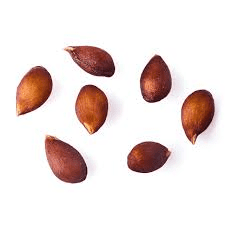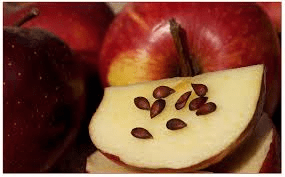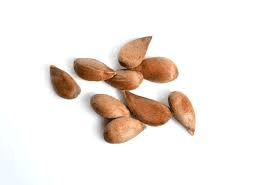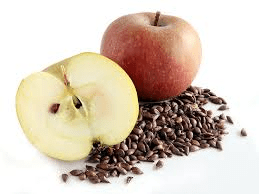Apple seeds, or pips, are the small, hard components found within the core of the apple. While they are often discarded, these seeds contain several interesting features and potential health implications. Understanding the composition and properties of apple seeds can provide insight into their role and effects on health.
Apple seeds are encased in a tough outer shell that protects the seed’s inner components. This hard coating is designed to shield the seed until it reaches the right conditions for germination. Inside the shell, the seeds are composed primarily of carbohydrates, proteins, and fats. They contain a notable amount of essential fatty acids, including omega-6 fatty acids, which are important for maintaining healthy cell membranes and supporting various bodily functions.
One of the most significant aspects of apple seeds is their content of amygdalin, a compound also known as vitamin B17 or laetrile. Amygdalin is a type of cyanogenic glycoside, meaning it can release cyanide when metabolized. In the body, amygdalin can be broken down into hydrogen cyanide, a toxic substance.
However, the levels of amygdalin in apple seeds are relatively low, and the body’s digestive system typically processes these seeds in such a way that the release of cyanide is minimal. This means that, while consuming a small number of apple seeds occasionally is unlikely to cause harm, ingesting large quantities could be dangerous.
In addition to amygdalin, apple seeds contain various antioxidants, including flavonoids and phenolic compounds. These antioxidants help combat oxidative stress and inflammation in the body. Some research suggests that these compounds may contribute to health benefits such as improved cardiovascular health and enhanced immune function. However, more research is needed to fully understand the extent of these benefits.
Apple seeds also contain trace amounts of essential vitamins and minerals, such as vitamin E, magnesium, and zinc. Vitamin E acts as an antioxidant, protecting cells from damage, while magnesium and zinc are important for numerous enzymatic and physiological processes in the body.
Despite their potential health benefits, it is important to consume apple seeds with caution. The presence of amygdalin and the potential for cyanide release means that eating large amounts can be risky. The body’s ability to handle cyanide from small quantities of apple seeds is generally sufficient, but it is wise to avoid excessive consumption. For most people, eating a few seeds occasionally does not pose a significant health risk.
In summary, apple seeds are small yet complex structures with a mix of nutrients and potential health effects. They contain essential fatty acids, antioxidants, and trace minerals that contribute to their nutritional profile. However, the presence of amygdalin, which can release cyanide, means that while moderate consumption is generally safe, consuming large quantities should be avoided. Understanding the properties of apple seeds can help make informed choices about including them in the diet and ensuring overall health and safety.
The Economic Importance and Uses of Apple Seeds

1. Apple Cultivation: Apple seeds are crucial for growing new apple trees, supporting the apple industry and contributing to agricultural sustainability.
2. Breeding and Research: Apple seeds are used in breeding programs to develop new apple varieties with improved traits, such as better flavor, disease resistance, or climate adaptability.
3. Health Supplements: Apple seeds are sometimes used in health supplements and natural remedies for their potential health benefits, including antioxidant properties.
4. Natural Pesticides: Extracts from apple seeds may be used as natural pesticides or in organic farming practices to control pests.
5. Animal Feed: Apple seeds can be used as a supplementary ingredient in animal feed, providing additional nutrients.
6. Industrial Uses: Apple seeds are processed into oils or other products for use in the cosmetic and personal care industries.
7. Environmental Benefits: Apple seed waste can be utilized in composting and as a component in sustainable agricultural practices.
8. Educational Purposes: Apple seeds are used in educational settings to teach about plant biology, germination, and seed development.
9. Nutritional Research: Studies on apple seeds contribute to research on their potential health benefits and nutritional content.
10. By-product Management: Managing apple seed by-products from juice and cider production helps reduce waste and improve resource utilization.
11. Organic Fertilizers: Apple seeds can be used in organic fertilizers or soil amendments, enhancing soil health and fertility.
12. Ethnobotanical Uses: In some cultures, apple seeds are used in traditional medicine and herbal remedies.
13. Innovation in Products: Apple seeds are explored for new product innovations, including natural additives and functional ingredients.
14. Sustainable Agriculture: Utilizing apple seeds helps promote sustainable agricultural practices by reducing waste and enhancing resource efficiency.
15. Carbon Footprint Reduction: Effective use and management of apple seeds contribute to reducing the carbon footprint of apple production processes.
16. Value-Added Products: Apple seeds are processed into value-added products, such as apple seed oil or extracts, for various uses.
17. Waste Reduction: By incorporating apple seeds into various products, the food industry can reduce waste and improve sustainability.
18. Research and Development: Ongoing research into apple seeds contributes to advancements in agriculture, health, and environmental sustainability.
Read Also: Honey Production Guide: The Basics to Get Started
The Products and By-products That Can Be Derived From Apple Seeds

1. Apple Seed Oil: Extracted from apple seeds, used in cosmetic products, skincare, and haircare.
2. Apple Seed Extracts: Concentrated extracts used in health supplements and natural remedies.
3. Animal Feed: Apple seeds processed into feed supplements for livestock.
4. Organic Fertilizers: Apple seeds used in composting or as a component of organic fertilizers.
5. Natural Pesticides: Extracts or processed apple seeds used in natural pest control products.
6. Functional Ingredients: Apple seeds processed into ingredients for functional foods or beverages.
7. Educational Kits: Apple seeds used in educational kits for teaching plant biology and seed germination.
8. Compost: Apple seeds added to compost to enrich soil and reduce waste.
9. Health Supplements: Apple seed powder or extracts used in dietary supplements for their potential health benefits.
10. Beauty Products: Apple seed oil or extracts used in skincare and cosmetic formulations.
11. Eco-Friendly Packaging: Apple seeds used in sustainable packaging materials or fillers.
12. Traditional Remedies: Apple seeds used in traditional medicine or herbal remedies.
13. Seedling Production: Apple seeds used to produce seedlings for new apple orchards.
14. Seed Powders: Ground apple seeds used in various culinary or nutritional applications.
15. Organic Soil Amendments: Apple seeds used to enhance soil health and fertility in organic farming.
16. Natural Additives: Apple seed derivatives used as natural additives in food products.
17. By-Product Management: Utilization of apple seeds from cider or juice production to manage by-products efficiently.
Read Also: Facts About Honey Bees
Frequently Asked Questions (FAQ’s) About Apple Seeds

1. Are apple seeds safe to eat?
Apple seeds contain amygdalin, which can release cyanide when metabolized. While consuming a few seeds is generally not harmful, large quantities should be avoided.
2. Can apple seeds be used to grow new apple trees?
Yes, apple seeds can be used to grow new apple trees, though they may require specific conditions and time for germination.
3. What are the potential health benefits of apple seeds?
Apple seeds contain antioxidants and may offer health benefits, but they should be consumed in moderation due to their cyanide content.
4. How are apple seeds processed into oil?
Apple seeds are cleaned, dried, and then pressed or extracted to produce apple seed oil, which is used in cosmetic and personal care products.
5. Can apple seeds be used as natural pesticides?
Yes, extracts from apple seeds can be used in natural pesticides to control pests in organic farming.
6. Are there any traditional uses for apple seeds?
In some cultures, apple seeds are used in traditional medicine or herbal remedies for their potential health benefits.
7. How can apple seeds be used in composting?
Apple seeds can be added to compost piles, where they decompose and contribute to the enrichment of the soil.
8. What are the risks of consuming apple seeds in large quantities?
Consuming large quantities of apple seeds can be harmful due to the presence of cyanide, which can be toxic in high doses.
9. How are apple seeds used in animal feed?
Apple seeds are processed and mixed into animal feed to provide additional nutrients for livestock.
10. Can apple seeds be used in beauty products?
Yes, apple seed oil and extracts are used in skincare and cosmetic products for their antioxidant and nourishing properties.
Read Also: Financial Projections for Waste Management Business

